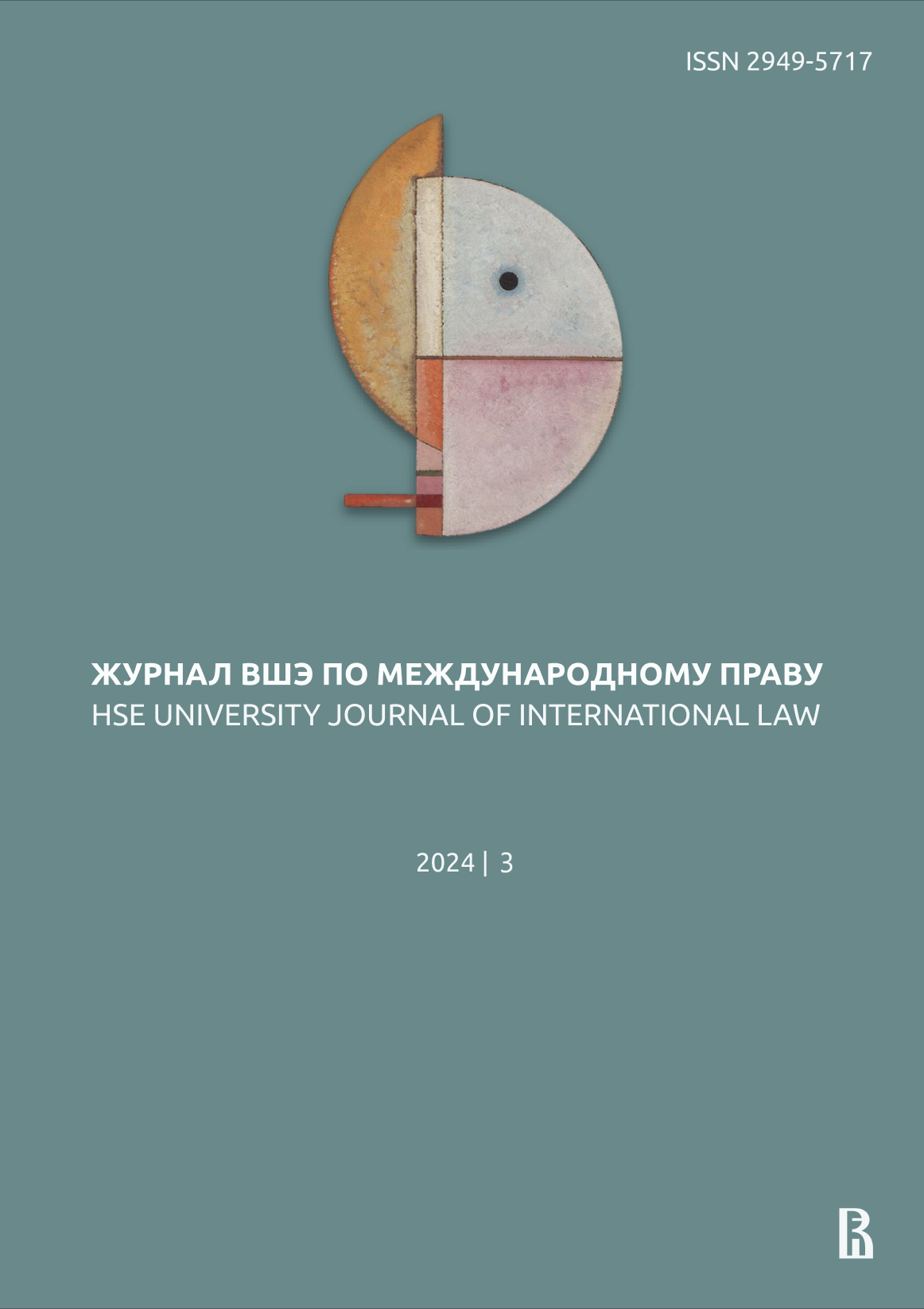The Practice of Self-Recusal and Recusal of Judges of the International Court of Justice
Abstract
The article proposes to analyse the practice of the International Court of Justice, which is developing in the area of recusal and self-recusal of judges. Based on the proposed analysis, the author attempts to doctrinally understand not only the actual institution of the recusal of a judge, which is becoming increasingly relevant in modern international lawfare, but also the closely related categories of impartiality and independence. These are complex and multidimensional concepts which, in the context of the study of international justice, have not been adequately addressed in Russian international law scholarship. Collisions of the legal status of a judge can be conditionally divided into two types: conflicts of permanent and conflicts of temporary incompatibility, which is reflected in the ICJ Statute and the practice of this Court. Almost every court, including the International Court of Justice, has mechanisms to deal with conflicts of interest among judges that create or are likely to create bias, or create or are likely to create doubts about independence. However, the jurisprudence of the ICJ in this regard is of particular interest because of the certain authority of the Court and long experience in dealing with such issues.
Downloads
References
Allars M. (2013) Disqualification for Bias and International Tribunals: Room for a Common Test. Missouri Law Review, vol. 78, pp. 379–411.
Bassett D., Perschbacher R. (2013) Perceptions of Justice: An International Perspective on Judges and Appearances. Fordham International Law Journal, vol. 36, no. 1, pp. 136–162.
Cassesse A. (2003) International Criminal Law, Oxford; New York: Oxford University Press.
Geyh C. (2014) The Dimensions of Judicial Impartiality. Florida Law Review, vol. 65, no. 2, pp. 493–551. DOI: https://doi.org/10.2139/ssrn.2016522
Giorgetti С. (2015) Challenges and Recusals of Judges and Arbitrators in International Courts and Tribunals. Leiden, Boston: Brill. DOI: https://doi.org/10.1163/9789004302129
Hernández G. (2012) Impartiality and Bias at the International Court of Justice. Cambridge International Law Journal, vol. 1, no. 3, pp. 183–207. DOI: https://doi.org/10.7574/cjicl.01.03.62
Ispolinov A. S. (2015) K 20-letiyu VTO: kriticheskiy vzglyad na praktiku Organa po razresheniyu sporov [20th Anniversary of the WTO: Critical Overview of the Practice of the Dispute Settlement Body]. Torgovaya politika, vol. 1, no. 1, pp. 10–30. (In Russian). DOI: http://doi.org/10.17323/2499-9415-2015-1-1-10-30
Ispolinov A.S. (2023) O bespristrastnosti sudey Mezhdunarodnogo Suda OON pri rassmotrenii dela o Yugo-Zapadnoy Afrike [Impartiality of Judges of the International Court of Justice when Considering the South-West Africa Case]. Rossiyskiy yuridicheskiy zhurnal, vol. 152, no. 5, pp. 27–38. (In Russian)
Kiseleva O. Dvoikh nado ubrat': eshchyo odna pobeda Rossii v mezhdunarodnykh sudebnykh voynakh [Two Must Be Taken Out: Another Russian Victory in International Lawfare]. Available at: https://zakon.ru/blog/2024/04/03/dvoih_nado_ubrat_esche_odna_pobeda_rossii_v_mezhdunarodnyh_sudebnyh_vojnah (accessed: 28.10.2024). (In Russian)
Kuijer M. (1997) Voting Behaviour and National Bias in the European Court of Human Rights and the International Court of Justice. Leiden Journal of International Law, vol. 10, no. 1, pp. 49–67. DOI: https://doi.org/10.1017/s0922156597000046
Ma X., Guo S. (2017) An Empirical Study of the Voting Pattern of Judges of the International Court of Justice (2005–2016). Erasmus Law Review, vol. 3, no. 10, pp. 163–174. DOI: https://doi.org/10.5553/elr.000094
Meron T. (2005) Judicial Independence and Impartiality in International Criminal Tribunals. The American Journal of International Law, vol. 99, no. 2, pp. 359–369. DOI: https://doi.org/10.2307/1562502
Ogbodo S. (2012) An Overview of the Challenges Facing the International Court of Justice in the 21st Century. Annual Survey of International & Comparative Law, vol. 18, no. 1, art. 7, pp. 93–113.
Maučec G., Dothan S. (2022) The Effects of International Judges’ Personal Characteristics on Their Judging. Leiden Journal of International Law, no. 35, pp. 887–895. DOI: https://doi.org/10.1017/s0922156522000577
Pimenova S. (2024) Spor Ukrainy protiv Rossii v ramkakh Konventsii o genotside kak odin iz klyuchevykh etapov yuridicheskoy voyny [The Dispute Between Ukraine and the Russian Federation under the Genocide Convention as the High Point of Lawfare]. Mezhdunarodnoe pravosudie, vol. 14, no. 2, pp. 77–94. (In Russian)
Posner E., Figueiredo M. de. (2004) Is the International Court of Justice Biased?. John M. Olin Program in Law and Economics Working Paper, no. 234, pp. 1–43. DOI: https://doi.org/10.2139/ssrn.642581
Suh I. (2017) Voting Behavior of National Judges in International Courts. American Journal of International Law, no. 3, pp. 163–174. DOI: https://doi.org/10.2307/2197412
Vittstum V., M. Bote, R. Dol'tser R. (eds.) (2011) Mezhdunarodnoe pravo (Volkerrecht). M.: Infotopik Media.
Voeten E. (2008) The Impartiality of International Judges: Evidence from the European Court of Human Right. American Political Science Review, vol. 102, no. 4, pp. 417–433. DOI: https://doi.org/10.1017/s0003055408080398
This work is licensed under CC BY-NC-ND 4.0


